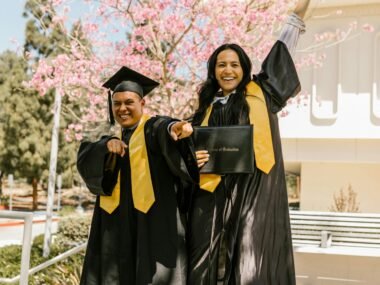The Fulbright Student Scholarship Program is one of the most prestigious scholarship programs anywhere in the world that enable students to go overseas for studies, teaching, and research. In 1946, the United States government established the J. William Fulbright Scholarship Program. Funding is mutual understanding between the United States and other countries.
This program provides grants for graduate students, young professionals, and artists to study internationally for graduate degrees, advanced research, university teaching, and primary and secondary school teaching.
Fulbright Student Scholarship Program in the USA
The Fulbright Student Scholarship Program aspires to offer a cultural exchange through the granting of education and research opportunities abroad. Every year, thousands of students participate in this program within more than 160 countries. It gives full scholarships to students for graduate study or research in their field with an opportunity to build cross-cultural interaction.
This is funded fully by the United States Department of State. Very competitive, the Fulbright Program, however, chooses recipients based on academic merit, leadership potential, and a good project proposal. It gives a chance to American citizens for higher studies abroad while international students can come to America through this program for higher education.
Benefits of the Fulbright Student Scholarship Program
- Fulbright Scholarship is fully funded: Tuition shall be covered, along with travel and health insurance costs, in addition to living expenses throughout the program period.
- Global Network: As a Fulbright scholar, one would be exposed to an international network comprising professionals, leaders, and alumni highly reputed in their respective fields.
- Cultural Understanding: The motive of the program should serve to increase cultural understanding through the interaction of the selected candidates coming from different backgrounds.
- Professional Growth: Whether in academic research or in professional growth, this opportunity with Fulbright opens up career prospects toward a global and work-oriented approach.
Eligibility Criteria for the Fulbright Student Scholarship Program
The candidates applying for the Fulbright Student Scholarship Program need to meet certain eligibility criteria. In any case, these differ for each country. General basic requirements include the following :
- Citizenship: If applying for the U.S. Fulbright Program to a given country, this would list citizenship/nationality. If the application is an International Application, this lists the participating country’s citizenship/nationality.
- Academic Qualifications: Requirement of at least a bachelor’s degree completed prior to the commencement of the grant.
- Project Proposal: Applicants will be required to provide a project proposal stating the research or study the applicant intends to undertake and how that study or research applies to the aims of the Fulbright program.
- Proficiency in the Language: While some countries may require applicants to have proficiency in their language, not all programs require this.
- Leadership and Community Participation: As far as possible, the program would favour applicants having some leadership potential, as well as commitment to community participation.
Application to Fulbright Student Scholarship Program
The process of applying to the Fulbright Student Scholarship Program is very long. To get through, one will have to make a very good application. The steps which one shall follow will be briefly explained herein:
1. Research on the Program and the Host Country
It is partly expected that applicants do some research on the Fulbright program before they embark on their applications, get to understand the various opportunities for their majoring area and the country they would want to apply to. Each country varies with regard to guidelines, and this may further shape how an applicant approaches their application.
2. Develop a Strong Project Proposal
Your project proposal is probably the most important part of your application. You should forthrightly identify what you will study or research, why it is important, and how it contributes to the country that hosts you. Be sure to address how your work aligns with the wider objectives of the Fulbright Program, which involve cultural exchange and mutual understanding.
3. Get Strong Letters of Recommendation
Letters of recommendation will be required from academic or professional mentors who can speak to qualifications and potentials. In choosing recommenders, select individuals that know you well enough and can write you personal and insightful letters.
4. Prepare a Personal Statement
Your personal statement shall outline your background, career goals, and how the Fulbright Program will help you realise those goals. This is where one has space to show his or her excitement and commitment to the program’s mission.
5. Submit the Application on Time
Make sure you fill in all parts of the application, including academic transcripts, language proficiency if necessary, and other supporting documents. Applications usually open a few months in advance, so allow yourself some time.
Tips for a Successful Fulbright Application
- Apply Early: Give yourself ample time-most importantly, writing about the project proposal and the personal statement.
- Custom Fit: Make sure that the project fits the country to which you are applying; know specific objectives of the Fulbright program in the country to which you are applying.
- Seek Feedback: Ask mentors and/or advisors to review your application materials to make sure they are clear and coherent.
- Demonstrate Cultural Sensitivity: As an ambassador from home, discuss how you would immerse yourself in the host culture to foster bilateral understanding – one of the main purposes of Fulbright.
What You Can Expect as a Fulbright Scholar
As Fulbright scholar, one will not only achieve academic or professional goals but live the culture of the host country. Experiences include seminars, conferences, and cultural events. Among others, and opportunities to make long-lasting contacts within the local communities and other scholars.
You will also become a cultural ambassador by sharing your experiences from your home country with others and learning from the customs and traditions of the host nation. This will be an immense contribution to the development of international cooperation and foster further understanding-actually, that constitutes the very essence of the Fulbright Program.
Conclusion
Applications to the Fulbright Student Scholarship Program encompass once-in-a-lifetime international experiences for students and professionals in building cross-cultural exchanges.
Full funding by the Fulbright Program, becoming part of an academic network worldwide, and professional development opportunities second to none-all this investment in your life is prestigious and valuable for anyone looking out into a vaster horizon.
Yes, if you possess the basic eligibility and a keen urge for cross-cultural exposure, then the Fulbright Program is an excellent avenue to reach your academic or research aspirations abroad.
FAQs about the Fulbright Student Scholarship Program
1. How competitive is the Fulbright Scholarship?
The Fulbright Scholarship is highly competitive; it receives several thousand applications each year from all over the world. Selections are based on academic merit, leadership potential, and quality of the proposed project.
2. Can I apply to the Fulbright Program if I’m not a US citizen?
Yes, Fulbright grants are available to US citizens going abroad and to international students coming to study in the United States. A different eligibility requirement and application process exist for each country to select and commission its own candidates.
3. In which fields does the Fulbright Program issue awards?
The Fulbright Program supports a wide range of fields, from sciences and the arts to humanities, public policy, and others. A good number of academic disciplines and professional areas have been allowed; some are country program-dependent.




